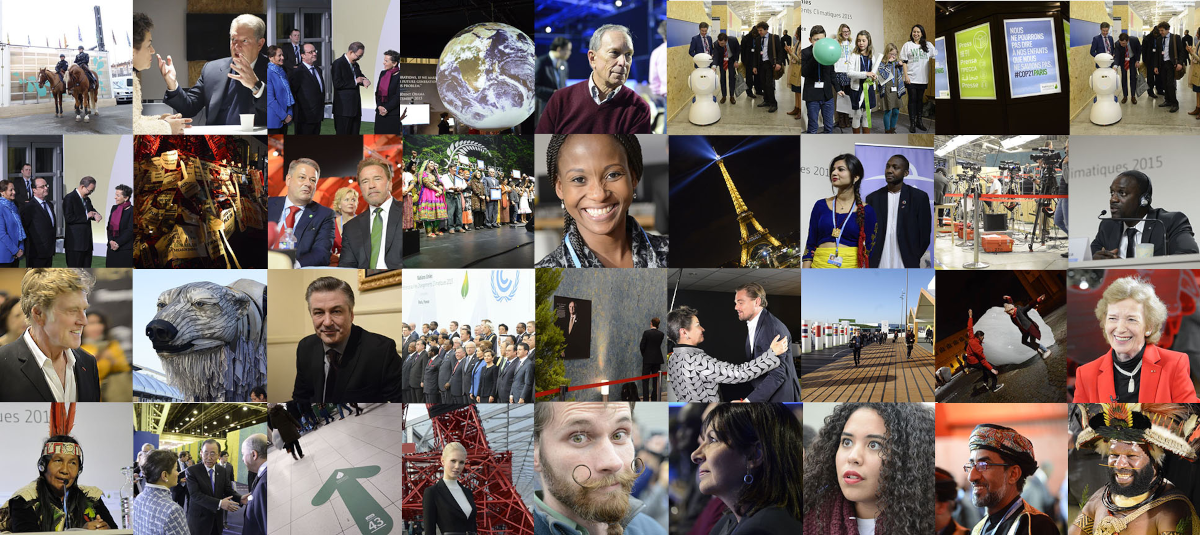CfP: Summit Art: Art and Political Events since the 1970’s
Deadline: 30 April, 2022 | Workshop: 14/15 October, 2022

Zusammenstellung des UNFCCC (United Nations Framework Convention on Climate Change) zum 1. Tag der COP21 in Paris, 2015, UNclimatechange, Quelle: Flickr
Organisation: Dr. Linn Burchert, linn.burchert@hu-berlin.de
Project: “Climate Summit Art. Art and Political Event, 1972–2022,” Department of Art and Visual History at the Humboldt-Universitaet zu Berlin, http://www.kunstgeschichte.hu-berlin.de/forschung/laufende-forschungsprojekte/klimagipfelkunst/climate-summit-art-art-and-political-event-1972-2022
‘Political art’ and ‘the political’ in contemporary art have formed a major focus in research for several decades. Nonetheless, significant political dimensions of art remain unexplored. The workshop “Summit Art: Art and Political Events since the 1970s” addresses art directly related to political summits and other institutionalised political media events. It welcomes investigations on art on the occasion of G8/G20 meetings, the World Economic Forum, United Nations Summits, etc., as well as anniversaries (e.g. of political institutions such as the UN, the World Health Organization, Earth Days and the like). At the workshop we will discuss art since the 1970s that has appeared in the very context of concrete political negotiations, events and ceremonies. Such art must be considered under different aspects than art exhibitions and art projects which, though labelled as ‘political,’ take place outside of such contexts (e.g. documenta, the international biennales, relational art and artistic activism outside the summits, etc.).
A particular feature of “Summit Art” is its incorporation into existing political and public (media) formats, rather than in the acknowledged art worlds. The workshop’s aim is to debate the interconnectedness of art and political summits, as well as to discuss how art contributes to and even shapes those often festival-like mega-media-events. “Summit Art” invites scholars from all relevant disciplines to explore the aesthetic, thematic, ideological, material, economic and infrastructural entanglements of summits/ political events and art. It welcomes case studies on the whole range of “Summit Art”, such as the official and unofficial summit programs, art commissions, art selected from calls for contributions, museum exhibitions as well as artistic activism. Proposals situated at the intersection of more than one of the following themes are especially welcome:
– Themes and ideologies: art’s and exhibitions’ relation to themes and policies negotiated at the summits, e.g. the affirmation or contestation of underlying ideologies of the events; artistic and curatorial positions that consciously address neglected themes/ perspectives
– Conditions of art: specific agents and institutions supporting and enabling art’s presence at political events – including considerations of funding and sponsoring arrangements/ interests, involving such different organisations/ agents as the UN, multinational companies, “philanthropists”, NGOs, foundations, etc.
– The significance of placement and mediation of art at the summits: e.g. art/ exhibitions at the conference building, summit-related fairs/ festivals, museums, galleries, corporate spaces, public spaces, etc.; considerations of the use of art in political and/or corporate media campaigns as well its embedding in official or unofficial ceremonies/ rituals
– Conceptions of the role of art and its “agency”: e.g. art as ‘problem mediator’, soft power/ means of (cultural) diplomacy, legitimation, as part of summit/ city/ nation/ corporate branding; art serving greenwashing practices and providing a “social license to operate” to its sponsors; art as part of activism, protest and counter-Summit events
– Status of and role expectations for artists: cultural leaders, entrepreneurs, mediators, delegates, activists, etc.
– “Summit Art” in the context of broader developments in museum and cultural policies as well as art criticism: e.g. the instrumental, social, ethical turns – considering specific funding guidelines and expectations directed towards art (e.g. regarding its socio-political as well as psychological efficacy)
– Aesthetics and art sociology: reflections on the aesthetics and strategies of “Summit Art” in terms of central art historical and sociological concepts, developments and ideas revolving around “autonomy”, “heteronomy”, “instrumentalisation”, “the curatorial”, art’s audiences, etc.
The 2-day meeting for the presentation of working papers will take place in October 2022 at the Humboldt-Universitaet, Berlin, Germany. It is currently planned as an in-person event, but, should the situation require it, a digital format will be considered. The workshop is part of the project “Climate Summit Art. Art and Political Event, 1972–2022” (funded by the German Research Foundation, project no: 451978827) at the Department of Art and Visual History at the Humboldt. Please send inquiries and proposals for 25-30 min presentations (ca. 300–500 words, plus a short bio of 150–200 words) to linn.burchert@hu-berlin.de by April 30, 2022. Qualified contributions will be proposed for publication in a journal or an edited volume.
Recommended readings by confirmed contributors:
Kirsty Robertson, “Capitalist Cocktails and Moscow Mules: The Art World and Alter-globalization Protest,” in: Globalizations 8 (4), 2011, S. 473–486, DOI: 10.1080/14747731.2011.585849.
Thomas Dekeyser, Subvertising: On the Life and Death of Advertising Power, Diss., University of Southampton 2018, https://eprints.soton.ac.uk/433200 (esp. Chapter 5).
Gavin Grindon, “Art & Activism,” Art Monthly 333 (2), 2010, S. 9–12.
Mikkel Bolt Rasmussen, After the Great Refusal. Essays on Contemporary Art, its Contradictions and Difficulties, Alresford 2018.
Linn Burchert, “Climate Summit Art. Art and Political Event, 1972–2022,” Research Exposé, Visual History. Online reference resource for historical visual research, 1/2022, https://visual-history.de/en/project/burchert-climate-summit-art.
Event website: http://www.kunstgeschichte.hu-berlin.de/veranstaltungen/cfp-summit-art-art-and-political-events-since-the-1970s-workshop

